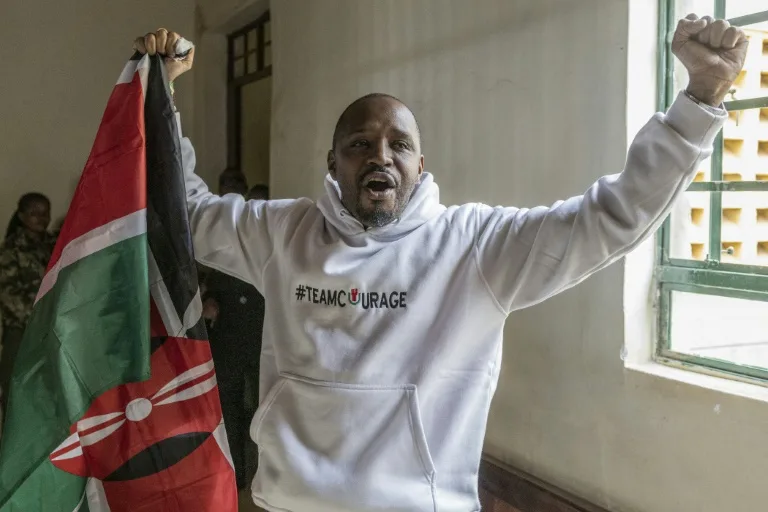Facebook Twitter (X) Instagram Somali Magazine - People's Magazine
On Monday, Kenyan authorities dropped terrorism charges against well-known activist Boniface Mwangi, sparking a wave of relief among rights groups and supporters. The decision followed public outrage over his weekend arrest, which many viewed as part of a larger crackdown on dissent.
Mwangi was arrested on Saturday and accused by police of facilitating terrorist acts. The charges sparked widespread criticism both locally and internationally. However, when he appeared in court on Monday, those serious charges were dropped and replaced with a lesser offense — unlawful possession of ammunition.
The new charges accused Mwangi of having three teargas canisters and one blank round of ammunition without proper authority. Mwangi denied all the charges and was released on a one-million-shilling personal bond, roughly equal to $7,000.
As he left the courtroom, Mwangi declared loudly, “Ruto must go,” referring to President William Ruto. Outside the court, he addressed his supporters and the press, saying, “The truth is our president is scared of young people, because they are organizing themselves and demanding better. Our president thinks people are being paid to go to the streets, and they think I am the financer. People hate Ruto for free.”
Kenya has recently witnessed a wave of deadly protests fueled by frustration over rising taxes, police brutality, and illegal arrests. The protests began in June 2024 and reignited last month after more violent incidents. Human rights organizations estimate that over 100 people have been killed by police since the protests started.
Mwangi’s arrest was part of what rights groups call an alarming trend — the misuse of anti-terror laws to silence political expression. A coalition of human rights organizations welcomed the dropping of the terrorism charges in Mwangi’s case but expressed deep concern that similar charges are being used against over 100 other people involved in protests.
“These charges are a dangerous way of dealing with public dissent,” the coalition said in a joint statement. They urged the Kenyan government to stop using terrorism laws to target peaceful protesters.
Interior Minister Kipchumba Murkomen recently stated that 71 people were facing terrorism-related charges linked to the violent protests. But critics say these charges are politically motivated and intended to intimidate those who speak out against the government.

In response, the Office of the Director of Public Prosecutions defended the terrorism charges, stating that they are based on legal standards and national security needs — not meant to suppress free speech or political protest.
Mwangi’s weekend arrest led to a huge online campaign demanding his release, with the hashtag #FreeBonifaceMwangi trending widely across social media.
A police search warrant used to raid his home and office claimed that he paid people to incite violence during the protests — a claim Mwangi strongly denies.
Mwangi is no stranger to arrests and controversy. He has been detained several times in Kenya for his activism. In May, he was also arrested in Tanzania while attending the trial of opposition leader Tundu Lissu. He and Ugandan activist Agather Atuhaire claim they were tortured and sexually assaulted while in custody before being deported back to their countries. Last week, they filed a case against the Kenyan, Tanzanian, and Ugandan governments at the East African Court of Justice.
As public pressure continues to grow, rights groups are calling for justice for all those arrested unfairly and demand accountability for the deaths and violence during the ongoing protests. The government’s handling of the situation remains under scrutiny, both locally and internationally.

